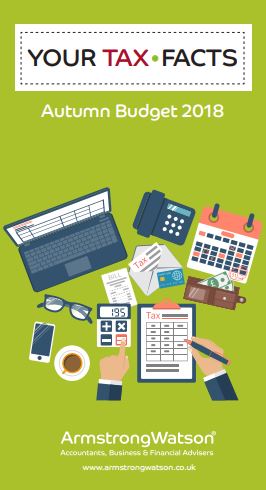In the main, the changes made are relatively specific and in the areas covered in our predictions document published last week - addressing real or perceived avoidance by businesses operating mainly in the insurance sector, those involved in the online retailing supply chain, or those in the construction industry. Also confirmed were: a ninth-successive Fuel Duty freeze; holds on Duty on beer, cider and spirits and changes to how VAT must be accounted for in respect of the issue, and redemption of vouchers.
Worthy of further attention is the announced freeze of the VAT registration threshold (currently £85,000) until April 2022, as well as confirmation that proposed changes to the rules around who can join a VAT group with effect from 1 April 2019.
The VAT registration threshold will remain unchanged for two years – the first time this has not changed since the current rules of establishing turnover for the purposes of assessing registration obligations came into force in 1990. Given there had been speculation leading into the budget as to whether the threshold would be dramatically slashed or marginally increased as normal, the freeze represents something of a surprise. In an uncertain climate, raising the threshold would have allowed small businesses more freedom to grow, with increased breathing space away from the “cliff edge” of a VAT registration threshold which so often represents a ceiling rather than a target. Smaller businesses sometimes make a conscious effort to remain under the registration threshold, and whilst today’s announcement is unlikely to change this, it may restrict growth which would otherwise be unthreatened by the obligation to register and account for VAT.
More positive is the confirmation of an amendments being made to VAT legislation which will allow a “non-corporate entity” (for example a partnership or individual) to join a VAT group with other members of a corporate group - provided that non-corporate entity has a business establishment in the UK, is liable or entitled to be VAT-registered in its own right, and can demonstrate that the control criteria in respect of groups is met.
These changes should represent welcome news to individuals, sole traders and partnerships, who for any of a number of reasons have historically seen a VAT cost created in their businesses by virtue of making basic intercompany supplies and charges.
These measures may also remove the historical need to rob Peter to pay Paul, in the sense that a VAT cost could be mitigated by grouping, but which in turn could be to the detriment of another desirable tax outcome due to having to be a certain type of entity to qualify for VAT group treatment. Businesses should now take stock and determine how these considerations will interact in order to establish the most beneficial structure for their business in a holistic sense.

